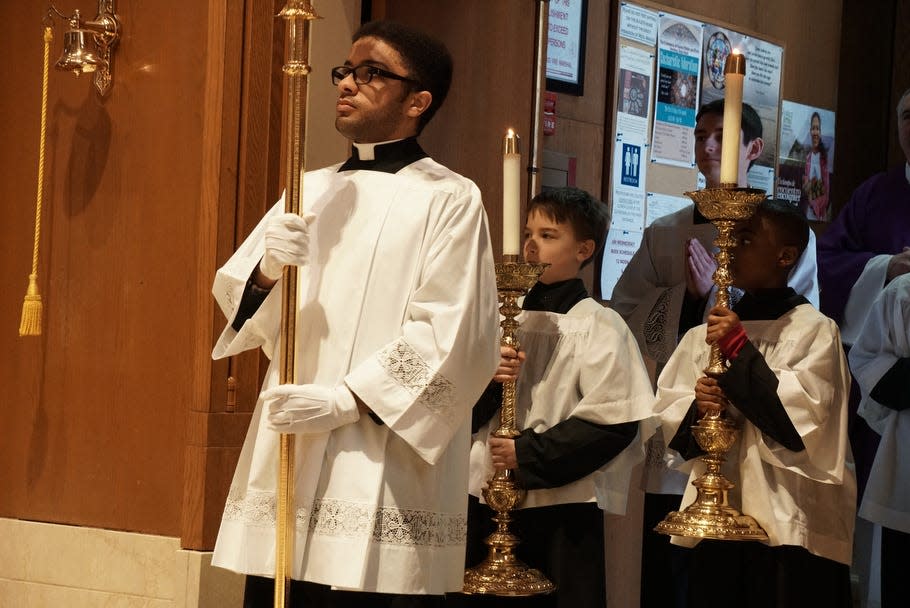Lent starts on Feb. 14 this year. Why do Catholics fast and give things up?
- Oops!Something went wrong.Please try again later.
For Roman Catholics and a number of other Christian denominations, it's the time of year to brainstorm what they're giving up for the next 40 days or so, whether that be chocolate, profanity, alcohol or something else.
Lent, the season that leads up to Easter, starts on Ash Wednesday, which this year falls on Feb. 14, coinciding with Valentine's Day. It's one of the six seasons of the Catholic liturgical calendar and is marked with solemnity.
Ash Wednesday "inaugurates the solemn season of Lent and challenges us all to renew our commitment to divine love and be reconciled by the grace of the Lord Jesus," the Most Rev. Richard Henning, bishop of the Providence Diocese, said in a statement.
Here's a bit more about the season.

When is Lent in 2024?
Lent starts on Feb. 14 and is observed for 40 days through abstinence and penitence. It ends with Easter, which falls on March 31 this year.
There are 46 days between Ash Wednesday and Easter Sunday, with six Sundays total. The Sundays aren't counted as part of the 40 days.
"The Sundays of Lent are certainly part of the Time of Lent, but they are not prescribed days of fast and abstinence," the United States Conference of Catholic Bishops said.
Why do Catholics give up things during Lent?
Lent is a reflection of the story of Jesus spending 40 days praying and fasting in the desert following his baptism.
"The Gospels tell us that after his baptism, Jesus fasted in the desert and then was tempted by the devil," according to the prayer app Hallow. "He resisted these temptations and then went to Galilee to begin his public ministry."
But even before this story, there are plenty of examples in the Bible of people turning toward fasting and other forms of abstinence to repent for sins and feel closer to God. Moses, for example, fasted for 40 days to "placate the Lord for the guilt of his unfaithful people," as Pope Paul VI wrote. And Catholics are certainly not the only religion to use fasting as a part of their faith.
Lent calls Christians to take up their "own cross and participate in the sufferings of Christ," Pope Paul VI’s apostolic constitution, Paenitemini, says.
And so, Christians take up their own cross by sacrificing something meaningful to them as a form of fasting for the duration of Lent, mirroring Jesus' sacrifices.
Why don't Catholics eat meat on Fridays during Lent?
Not so long ago, Catholics were obligated to forgo meat every Friday of the year, as that was the day Jesus died. In 1966, the meat restriction was relaxed by Vatican II.
But Catholics remain obligated not to eat meat on Fridays during Lent, as well as on Ash Wednesday and Good Friday.
What you can eat during Lent: Can't eat meat on Fridays because of Lent? Here's what Catholics, some Christians can eat
The U.S. Conference of Catholic Bishops' pastoral statement on penance and abstinence preserves "the tradition of abstinence from meat on each of the Fridays of Lent, confident that no Catholic Christian will lightly hold himself excused from this penitential practice.”
William Johnston, associate professor of religious studies at the University of Dayton, told USA TODAY that worshipers aren't supposed to eat any "flesh meat" that comes from land.
Here's what people aren't supposed to eat on Fridays during Lent:
Beef (cow)
Pork (pig)
Chicken
Turkey
Sheep
Fish, as well as dairy products, are allowed.
This article originally appeared on The Providence Journal: Lent starts on Feb. 14 in 2024. Why do Catholics give things up for it?

